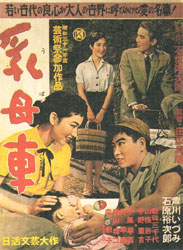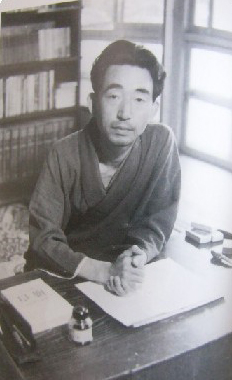|
The Baby Carriage
is a 1956 black-and-white Japanese film directed by Tomotaka Tasaka. Cast * Yujiro Ishihara as Muneo Aizawa * Michiyo Aratama was a Japanese film and stage actress. Biography After graduating from the Takarazuka Music and Dance School, Aratama joined the Takarazuka Revue in 1945. She gave her film debut in 1951, but it was not before 1955 that she left the Takarazuk ...: Tomoko Aizawa * Izumi Ashikawa: Yumiko Kuwahara * Toyo Fukuda: Katsu Kijima * Ryoha Hatanaka: Old man * Hiroshi Hijikata: Policeman * Ikunosuke Koizumi * Eiko Misuz: Natsuko Murakami * Kyoko Mori: Mariko Aizawa * Sanae Nakahara: Sachiko Kaneda * Sonosuke Niki * Masao Oda: Doctor * Akiko Sagawa: Shige, maid * Ichiro Sakai References External links * Japanese black-and-white films 1956 films Films directed by Tomotaka Tasaka Nikkatsu films 1950s Japanese films Japanese drama films 1956 drama films {{1950s-Japan-film-stub ... [...More Info...] [...Related Items...] OR: [Wikipedia] [Google] [Baidu] |
Tomotaka Tasaka
was a Japanese film director. Career Born in Hiroshima Prefecture, he began working at Nikkatsu's Kyoto studio in 1924 and eventually came to prominence for a series of realist, humanist films made at Nikkatsu's Tamagawa studio in the late 1930s such as '' Robō no ishi'' and ''Mud and Soldiers'', both of which starred Isamu Kosugi. His war film, ''Five Scouts'', was screened in the competition at the 6th Venice International Film Festival. Tasaka was a victim of the atomic bombing of Hiroshima and spent many years recovering. He eventually resumed directing and won the best director prize at the 1958 Blue Ribbon Awards for ''A Slope in the Sun'', which starred Yūjirō Ishihara. His brother, Katsuhiko Tasaka, was also a film director, and his wife, Hisako Takihana, was an actress. Selected filmography * ''Five Scouts'' (五人の斥候兵, Gonin no sekkōhei) (1938) * '' Robō no ishi'' (路傍の石) (1938) * ''Mud and Soldiers'' (土と兵隊, Tsuchi to heitai) (1939) * ... [...More Info...] [...Related Items...] OR: [Wikipedia] [Google] [Baidu] |
Nikkatsu
is a Japanese entertainment company known for its film and television productions. It is Japan's oldest major movie studio, founded in 1912 during the silent film era. The name ''Nikkatsu'' amalgamates the words Nippon Katsudō Shashin, literally "Japan Motion Pictures". Shareholders are Nippon Television Holdings (35%) and SKY Perfect JSAT Corporation (28.4%). History Founding in 1912 Nikkatsu was founded on September 10, 1912, when several production companies and theater chains, Yoshizawa Shōten, Yokota Shōkai, Fukuhōdō and M. Pathe, consolidated under the name Nippon Katsudō Shashin. The company enjoyed its share of success. It employed such notable film directors as Shozo Makino and his son Masahiro Makino. During World War II, the government ordered the ten film companies that had formed by 1941 to consolidate into two. Masaichi Nagata, founder of Daiei Film and a former Nikkatsu employee, counter-proposed that three companies be formed and the suggestion was appr ... [...More Info...] [...Related Items...] OR: [Wikipedia] [Google] [Baidu] |
Yōjirō Ishizaka
was an influential and popular novelist of post-World War II Japan. Education, early career, and family Born at Daikancho 82, Hirosaki, Aomori Prefecture, Ishizaka went to Hirosaki Middle School in 1913 and then to Keio University in 1920. Upon graduating, he took a position at Hirosaki Women's High School. Later, he became a teacher at Akita Women's High School. From 1929 to 1938 he taught at Yokote Junior High School. In 1939, he moved to Tokyo, and in 1940, during World War II, he was a news correspondent in the Philippines. One of his granddaughters was Tomi Pierce (1953-2010), a writer and later producer of video games including Prince of Persia and The Last Express (admired for its story-telling), with Jordan Mechner; she also worked with her husband Doug Carlston, founder of Broderbund. Another granddaughter, Tomi's sister Naomi Pierce, is an authority on butterflies and a professor at Harvard University. Writing career His novel ''Blue Mountain Range'' (青い山脈 ... [...More Info...] [...Related Items...] OR: [Wikipedia] [Google] [Baidu] |
Tsutomu Sawamura
Tsutomu is a masculine Japanese given name. Possible writings ''Tsutomu can be written using different kanji characters. Here are some examples: *勉, "make effort" *務, "affairs" *務武, "affairs, warrior" *勤, "diligence" *努, "strive" The name can also be written in hiragana つとむ or katakana ツトム. Notable people with the name *,Japanese manga artist *, Japanese general in the Imperial Japanese Army *, Japanese tenor *, former Japanese shihan *, Japanese football player *, Japanese politician *, Japanese Greco-Roman wrestler *, Japanese film director *, Japanese wrestler *, Japanese ice hockey player *, Japanese politician and Prime Minister of Japan *, Japanese rugby union player *, Japanese professional golfer *, Japanese head coach of the Sun Rockers Shibuya *, Japanese actor and voice actor *, Japanese former manager *, Japanese former Nippon Professional Baseball pitcher *, Japanese voice actor *, Japanese ice hockey player, coach and administrator * ... [...More Info...] [...Related Items...] OR: [Wikipedia] [Google] [Baidu] |
Cinema Of Japan
The has a history that spans more than 100 years. Japan has one of the oldest and largest film industries in the world; as of 2021, it was the fourth largest by number of feature films produced. In 2011 Japan produced 411 feature films that earned 54.9% of a box office total of US$2.338 billion. Films have been produced in Japan since 1897, when the first foreign cameramen arrived. ''Tokyo Story'' (1953) ranked number three in ''Sight & Sound'' critics' list of the 100 greatest films of all time. ''Tokyo Story'' also topped the 2012 ''Sight & Sound'' directors' poll of The Top 50 Greatest Films of All Time, dethroning '' Citizen Kane'', while Akira Kurosawa's '' Seven Samurai'' (1954) was voted the greatest foreign-language film of all time in BBC's 2018 poll of 209 critics in 43 countries. Japan has won the Academy Award for the Best International Feature Film four times, more than any other Asian country. Japan's Big Four film studios are Toho, Toei, Shochiku and Kadoka ... [...More Info...] [...Related Items...] OR: [Wikipedia] [Google] [Baidu] |
Kinema Junpo
, commonly called , is Japan's oldest film magazine and began publication in July 1919. It was first published three times a month, using the Japanese ''Jun'' (旬) system of dividing months into three parts, but the postwar ''Kinema Junpō'' has been published twice a month. The magazine was founded by a group of four students, including Saburō Tanaka, at the Tokyo Institute of Technology (Tokyo Technical High School at the time). In that first month, it was published three times on days with a "1" in them. These first three issues were printed on art paper and had four pages each. ''Kinejun'' initially specialized in covering foreign films, in part because its writers sided with the principles of the Pure Film Movement and strongly criticized Japanese cinema. It later expanded coverage to films released in Japan. While long emphasizing film criticism, it has also served as a trade journal, reporting on the film industry in Japan and announcing new films and trends.加藤幹郎 ... [...More Info...] [...Related Items...] OR: [Wikipedia] [Google] [Baidu] |
Michiyo Aratama
was a Japanese film and stage actress. Biography After graduating from the Takarazuka Music and Dance School, Aratama joined the Takarazuka Revue in 1945. She gave her film debut in 1951, but it was not before 1955 that she left the Takarazuka Revue, signing first with Nikkatsu film studios, then, after her contract expired, with Toho. She worked for directors such as Mikio Naruse, Yasujirō Ozu and Masaki Kobayashi, appearing in films like ''The Human Condition'', ''The End of Summer'', ''Kwaidan'' and ''47 Ronin''. Since the late 1970s, she concentrated solely on stage and television work. Due to health problems, she reduced her appearances after 1994. She died of heart failure in 2001. Selected filmography Films Television Awards Michiyo Aratama received the Blue Ribbon Award for Best Supporting Actress for ''The Human Condition'' and ''Watashi wa kai ni naritai'', and the Kinema Junpo Award , commonly called , is Japan's oldest film magazine and began publication i ... [...More Info...] [...Related Items...] OR: [Wikipedia] [Google] [Baidu] |
Izumi Ashikawa
is a Japanese actress. Ashikawa was called the Japanese Audrey Hepburn. In 1953, Ashikawa was scouted by director Yuzo Kawashima and joined the Shochiku studio. She made her film debut with ''Tokyomadamu to Osakafujin'' directed by Yuzo Kawashima. In 1955, she moved to the Nikkatsu studio and gained popularity. In 1968, Ashikawa married actor Tatsuya Fuji and retired. She made her final film appearance in the 1968 film ''Koto no Taiyo''. Selected filmography *''Tokyomadamu to Osakafujin'' (1953) * ''The Baby Carriage'' (1956) * '' The Balloon'' (1956) * ''Sun in the Last Days of the Shogunate'' (1957) * '' Suzaki Paradise: Akashingō'' (1957) * ''Man Who Causes a Storm'' (1957) * ''The Perfect Game'' (1958) * '' Kurenai no Tsubasa'' (1958) * ''A Slope in the Sun'' (1959) * ''Mutekiga Ore o Yondeiru'' (1960) * ''Man with a Shotgun is a 1961 Japanese Western film directed by Seijun Suzuki in the vein of the Nikkatsu Studio's "borderless action cinema". Hideaki Nitani stars as ... [...More Info...] [...Related Items...] OR: [Wikipedia] [Google] [Baidu] |
Japanese Black-and-white Films
Japanese may refer to: * Something from or related to Japan, an island country in East Asia * Japanese language, spoken mainly in Japan * Japanese people, the ethnic group that identifies with Japan through ancestry or culture ** Japanese diaspora, Japanese emigrants and their descendants around the world * Japanese citizens, nationals of Japan under Japanese nationality law ** Foreign-born Japanese, naturalized citizens of Japan * Japanese writing system, consisting of kanji and kana * Japanese cuisine, the food and food culture of Japan See also * List of Japanese people * * Japonica (other) * Japonicum * Japonicus * Japanese studies Japanese studies (Japanese: ) or Japan studies (sometimes Japanology in Europe), is a sub-field of area studies or East Asian studies involved in social sciences and humanities research on Japan. It incorporates fields such as the study of Japanese ... {{disambiguation Language and nationality disambiguation pages ... [...More Info...] [...Related Items...] OR: [Wikipedia] [Google] [Baidu] |
1956 Films
Events January * January 1 – The Anglo-Egyptian Condominium ends in Sudan. * January 8 – Operation Auca: Five U.S. evangelical Christian missionaries, Nate Saint, Roger Youderian, Ed McCully, Jim Elliot and Pete Fleming, are killed for trespassing by the Huaorani people of Ecuador, shortly after making contact with them. * January 16 – Egyptian leader Gamal Abdel Nasser vows to reconquer Palestine. * January 25– 26 – Finnish troops reoccupy Porkkala, after Soviet troops vacate its military base. Civilians can return February 4. * January 26 – The 1956 Winter Olympics open in Cortina d'Ampezzo, Italy. February * February 11 – British spies Guy Burgess and Donald Maclean resurface in the Soviet Union, after being missing for 5 years. * February 14– 25 – The 20th Congress of the Communist Party of the Soviet Union is held in Moscow. * February 16 – The 1956 World Figure Skating Championships open in Garmisch, West Germany. * February 22 – ... [...More Info...] [...Related Items...] OR: [Wikipedia] [Google] [Baidu] |



